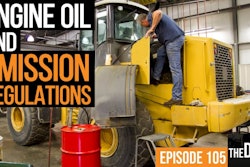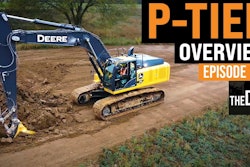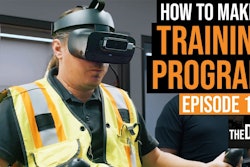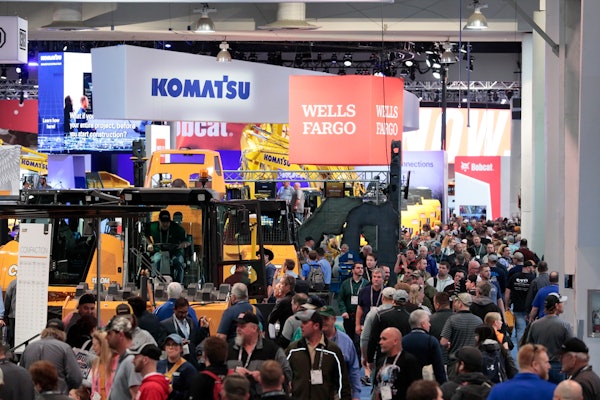Equipment operators aren’t the only ones having to learn about new technologies like GPS machine control and telematics.
In this episode of The Dirt, we get the dealership’s perspective on the rapid advancements in the equipment industry and how to ensure their customers are being served as well as possible.
Vince Pagano, senior vice president for Highway Equipment & Supply Co., a Volvo CE dealership in Pennsylvania, discusses the challenges dealers face in keeping up with new technology.
For Highway Equipment & Supply, the challenge has meant making sure salespeople are equipped with the knowledge to help customers get the technology they need. Dealers also need to make sure customers are properly trained on the new technology, and their service departments have to be prepared to install the equipment as well as perform the necessary software updates.
Because of the rapid increase in demand for new technology, Highway Equipment & Supply created a new position for IT service support. The job involves focusing on updating customers’ machine software, as well as keeping up with any internal software updates for its technicians. The new position saves technicians from having to spend valuable time performing lengthy software updates – time better spent servicing equipment.
Another area of technology dealerships handle is telematics – offsite monitoring of equipment to let the customer know of upcoming service needs and troubleshooting any mechanical problems. One challenge becomes making sure you’re getting the customer the right information at the right time without overloading them with data.
So if you’ve ever wondered about the dealers’ side of equipment technology, check out the latest episode of The Dirt.
Equipment World serves up weekly videos on the latest in construction equipment, work trucks and pickup trucks – everything contractors need to get their work done. Subscribe and visit us at equipmentworld.com!
In this episode:
00:00 - Intro: What Are the Challenges Dealerships Face With New Construction Technology?
00:54 - How Has New Construction Technology Impacted Dealerships?
01:55 - Is Technology Inside or Outside of the Cab More Difficult to Manage?
03:24 - How to Hire the Right People for Technology Maintenance on Construction Equipment
06:50 - New Job Opportunities for Technicians Due to Construction Technology
09:57 - What Challenges Has New In-Cab Technology Created for Dealerships?
12:26 - What Resources Should Dealerships Receive From OEMs?
15:12 - Outro: Final Thoughts on the Challenges Dealerships Face
Bryan Furnace (00:00):
Hi everybody. Welcome back to Equipment World. You're watching The Dirt. I'm your host Brian, and today we're here to talk about technology in the industry, which we talk about here all the time because it's a huge topic. But today we're coming at it from a different angle. We're going to talk about it from the dealership side. As new technology rolls out both inside the cab with things like machine control and outside the cab when it comes to engine monitoring systems and telematics. You have all of these components that dealerships are responsible for implementing to you, the customer. What are some of the challenges they face? So with that being said, we're going to talk with Vince Pagano from Highway Equipment and Supply. They are a Volvo dealership and they have been having to face all of these uncertainties as manufacturers roll out all of these new technological breakthroughs. At the dealership level, how has this sudden huge influx of technology really impacted you guys?
Vince Pagano (01:01):
Well, it's impacted us from a variety of levels. First of all, starting with our sales organization, our salesmen trying to evaluate our market and our customer demand for the wide variety of technology, whether it's on the machine, whether it's transactional technology systems, that's been a bit of a challenge. And then trying to figure out based upon that demand and or need, how are we going to be able to support the customer when they do, for example, jump into something that might be, for example, grade control on an excavator that isn't as widely used right now, but we can definitely see that coming. So again, you have really a couple different things. Sales competency and then support competency. That is really a challenge because of the pace of the demand seems to be increasing quicker than we're able to train and recruit people to take care of both sides of the fence there.
Bryan Furnace (01:55):
So again, as a contractor, I think about this in very different terms than you guys probably do. It occurs to me, there's kind of two parts of this technological thing happening. There's the in cab technology, which is what guys like myself are concerned with because that's what we're using every day. But then on the backside of this, there has been this great coming forth of technology when it comes to engine management, controlling the transmission, all of the different controllers on the machine. So of those two, what have you guys found has been your bigger challenge?
Vince Pagano (02:29):
Really probably the in cab competency levels. Again, that go with not only our sales competency, actually trying to train our customers that maybe aren't as familiar with that technology, and then again, the support side of things. We're getting kind of used to, I think what you're referring to is the telematics side of things. So the telematics systems that we utilize, and I'll talk specifically about Volvo, identifying when there is information that we need to act on, certainly from a service standpoint. Trying to figure out what information is valuable from customer to customer. Some information may be valuable to a customer, some information they may not care so much about. But there's so much information that's out there that trying to manage the input of that information and then the output is a challenge, but we're starting to get our hands around that because it's been out there for a long enough time that we should be somewhat proficient on that side of things.
Bryan Furnace (03:24):
As technology has kind of changed even from the standpoint of the emissions packages and all of the software that goes into controlling those sensors and monitoring what's going on, have you found on the tech side you guys are also struggling or have you guys been able to keep pace kind of on that side?
Vince Pagano (03:42):
There's no doubt. I think most distributors are struggling with that side of things. The traditional technician... And when I say traditional, I'm talking about the nuts and bolts side of the repair is challenging enough. And then you got to add on top of that, the layer of having some kind of technical expertise with software repair and understanding that side of it is a challenge. One of the things that Highway has done over the last couple years is to try to even separate the recruitment of the technological side of the repair. So we may not necessarily need somebody fully trained and factory trained with a nuts and bolts repair, but if they're proficient enough and running a computer, which a lot of the diagnostics these days is done purely by computer, even the traditional text will use that.
(04:25):
We may be able to fix a machine or at least get out ahead of a problem by simply hiring somebody that has some technological expertise, even if they're from say the industrial side of things, put them out in a truck, plug into the machine. And then the correspondence between maybe somebody onsite at the dealership in our service department can have some discussions with that "field tech" who is primarily there from the technical side of things, we could probably fix the machine. It could be just simply a software update. Trying to address that situation with our traditional techs probably isn't the most efficient way for them to spend their day. For example, if they got to plug into a machine and sit there for an hour and a half waiting for a software patch to download, not the most efficient use of their time, I could easily do that with somebody that has some basic computer skills and attack it that way. That's one of the things we're working on and we're actually building on. We have somebody in house that's doing that right now.
Bryan Furnace (05:21):
Interesting. So kind of a spinoff question of that, that hasn't really occurred to me up until this point. Have you guys had to change the criteria you look for when hiring on new techs? Traditionally, you look for the wrench head, the gear head, that's always working and tinkering on things. But as technology has crept into this, has that criteria started to change to weed some of those guys out?
Vince Pagano (05:44):
I mean it's changed to the standpoint that we are still looking to hire somebody with that full breadth of expertise. But at the same time, I might try to recruit somebody specific to the technological side of things. There's plenty of work and service work to be done with a laptop, whether it is a software update, whether it's a diagnostic exercise. We just got done updating the telecommunications communication level from 3G to 4G. That took months and months to do, and I had essentially an in-house computer guy do that. So I'm not sure I'm answering your question, but we really haven't changed our recruitment tactics other than to say we are looking for a fully experienced technician that has all of the above because we still could certainly utilize that level of expertise with our traditional technicians. Having that as an additional skill set is certainly not a negative, but basically to attack the volume of work that is typically software related, having that extra person on hand, that computer savvy person has certainly helped to manage that volume.
Bryan Furnace (06:50):
So this is interesting. Another big topic of conversation that I'm often involved with is recruitment opportunities and employment opportunities within the industry. And if I'm understanding it correctly, you are actually supplementing your traditional wrench hands with now someone that is almost strictly dedicated to the computer side of things. So there's been a creation of a new job position due to the technology component. Did I understand that correctly?
Vince Pagano (08:34):
That's exactly right. And not only are we helping our customers with machine repairs, but they're also a versions of software diagnostics that our customers have. This person will attend to those software needs as well. And we have, all of our technicians have laptops, which are constantly in need of software updates. That position will address those additional things. So when you look at the job description for this, we call IT service support. This individual is attacking customer repair needs that are software related or technical related, customer diagnostic software repairs as well as our internal software repairs for our diagnostic equipment. So there's kind of a three main level of responsibility for this individual and this role.
Bryan Furnace (09:23):
So if I were to have asked you in the last five to 10 years, if you ever saw the need to create an equipment geek squad, what would your response have been?
Vince Pagano (09:33):
I would've said probably unlikely. That kind of describes how quickly this is really advanced, even over the last, I'd say two to three years. And I think a lot of the recruitment challenges in general for our industry has rarely created a whole other level of concern. But to answer your question, there's no way I would've saw this coming five, 10 years ago. No way.
Bryan Furnace (09:55):
That's fascinating. Very interesting. So kind of moving back to inside the cab. We kind of touched on it, you not only have the kind of telematics that are communicating with the office, but more realistically for operators like myself, you're now dealing with a lot more machine control. And I know just within my time in the industry, machine control has gone from fairly basic, fairly straightforward to now there's just this multilayer thing that you can do. Infield designs, I mean, you can do a stunning amount of stuff, but along with that comes a lot of complexity with the actual software. So what challenges has that presented you guys with as a dealership? Because you guys have to train on all of this.
Vince Pagano (10:34):
Sure. Yeah, and I kind of touched on it earlier, the sales competency is a whole different level. And I think part of our responsibility is to evaluate the demand from our customer base. And it will vary from market to market, even within our own territory. The more rural locations and more rural based customers, they're not really thinking about infield design on an excavator, for example. More the city located customers are definitely thinking about this a lot more. And again, just seeing the advancement of the interest in that over the last two years in certain parts of our territory has been remarkable. So you got the sales competency, which is a challenge.
(11:11):
And being a former salesperson, I can tell you that if the product knowledge isn't there, you're probably not too thrilled about going out to promote that particular product. Having said that, you still need to address the demand with your customers. Operator training. Somebody like yourself who may be used to running a machine on a manual basis for years and years and years, probably isn't going to embrace the new infield design or the new grade control as much as somebody just basically just starting out over the last couple years. That's clearly a challenge, and that's nothing that we don't expect. It's just the way it is with a lot of different customers.
(11:46):
And then of course, the service aspect of things. Installing grade control and excavator with all the different sensors and wires, it's not the easiest thing. It's not like going in and replacing a starter or a water pump. It's a lot more technical knowledge and skill than something compared to, again, a nuts and bolts type of repair. So that is an additional layer of challenge. So we're really trying to assess the demand and we're trying to get into it as much as we can to make sure that if our sales guy goes out and offers the service and the product, he feels comfortable enough that on the back end we can take care of the customer from an operator standpoint and certainly from a service standpoint.
Bryan Furnace (12:26):
So my final question for you is you, you've kind of laid all of the groundwork for the challenges that face you guys as dealers, as you work, again inside and outside the cab, there are challenges on both sides. So my final question is, as someone at the dealership level, what sort of resources, what kind of support would you like to see from manufacturers to help ease some of the workload that you guys are being hit with in the training and trying to implement the technology that the manufacturers are putting out there?
Vince Pagano (12:56):
I mean, I think the obvious answer really is to make sure that both parties have enough product knowledge so that we can, again, address the demand. If Volvo, for example, is promoting their brand of grade control, clearly they need to have a product specialist on hand, not just to sell, but to make sure it can be supported. We as dealers share that responsibility, and I don't want to completely rely on it on any OEM to be the primary contact for something like this. We have a responsibility, especially if we're going to sell it to a customer, to take it from soup to nuts, from sales to support. So yeah, I think beyond that, there needs to be a real joint effort to make sure that both parties are invested. And then again, from soup to nuts, it could be taken care of so that the customer feels comfortable with the purchase that they made and then moving forward, running it and operating it, knowing that they're going to have the support from the dealer. Yeah, that's a pretty obvious statement, but it's highly critical.
Bryan Furnace (13:55):
Well, I was going to say, do you really feel that the educational support that you receive as the dealership is at the level that it needs to be versus where the technology is at that is being thrown out into the field?
Vince Pagano (14:07):
I do. I think, and I'll just speak from our dealership and our OEM, Volvo specifically, I haven't had a lot of interaction with this specific, the grade control, for example, but enough to know that there are multiple experts, not only locally here in our area, because we happen to be in the same state as our primary OEM.
Bryan Furnace (14:28):
Well, that's cheating.
Vince Pagano (14:29):
Yeah. That's a good advantage to have. Trust me. But we're actually in their backyard for the entire region of North America. But they also additionally have global support, which I've even interacted with some degree specific on this particular topic to know that they've got full engagement, a full knowledge, and they can provide us with the support that we need. And again, we need to make sure that we're as self-sufficient on our end, but something like this, I think it's really a joint effort to make sure that we've got all the bases covered. For sure.
Bryan Furnace (15:03):
Absolutely. Well, Vince, thank you so much for all the information. This has been awesome, and it's been a really unique perspective into what you guys are facing on your side of the table.
(15:11):
Well, thank you again to Vince for coming on the show and taking the time to discuss technology with us. As you can see, dealerships have their own set of challenges because everything we get in the field that we get to play with these guys have to learn and then learn how to teach it to the dumb dirt guys like us out in the field. That's a challenge. And then on top of that, they have to figure out how to work and service these systems while we break them. We don't have to deal with any of that in the field. We let them handle it, which means they have another challenge in addition to the challenges we have as operators in the field. So I don't know about you guys. I feel like this was a pretty unique perspective and some pretty interesting conversation. I hope it helps you somehow in your business moving forward. Thanks for watching, and we'll catch you on the next episode of The Dirt.










